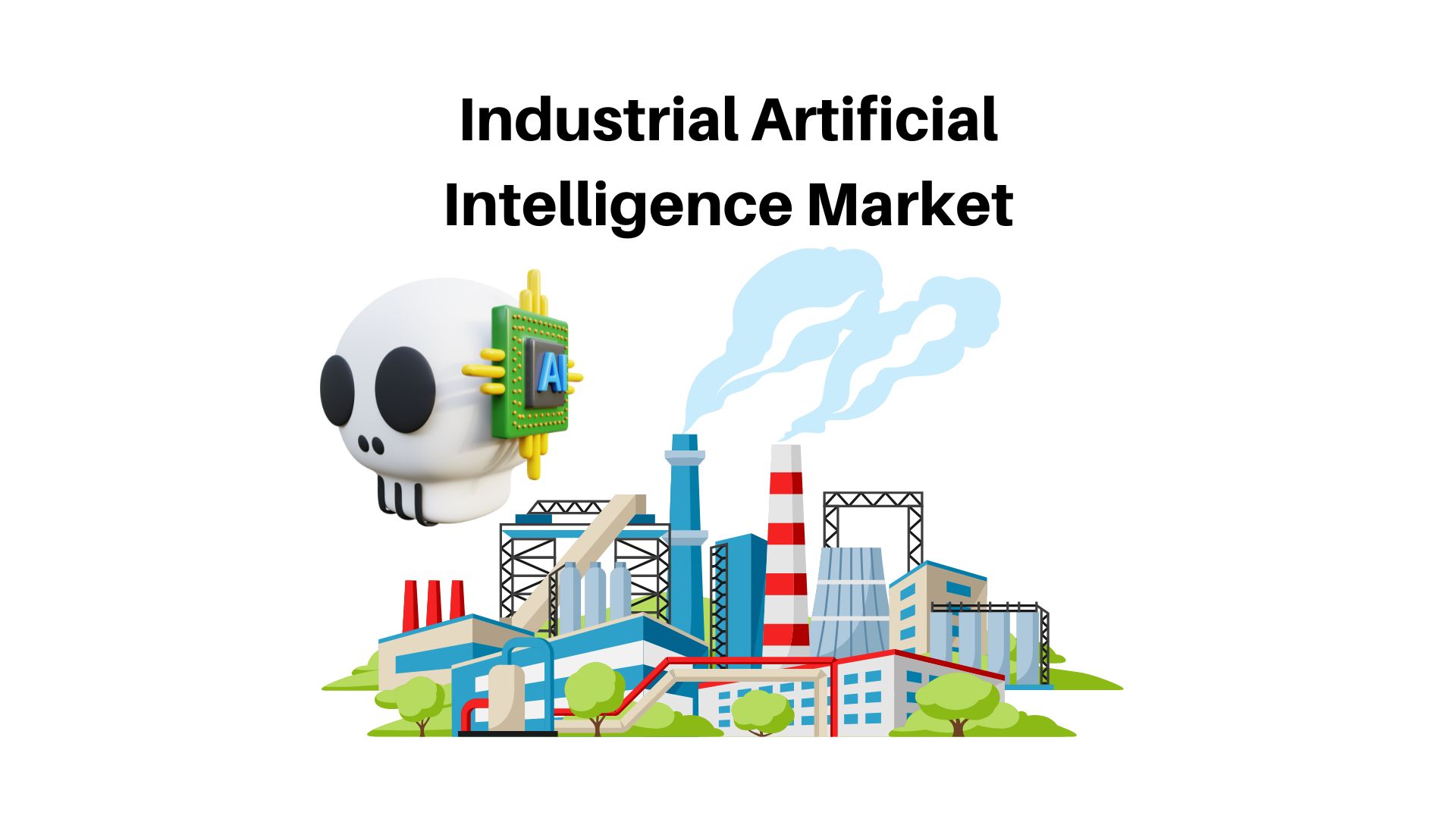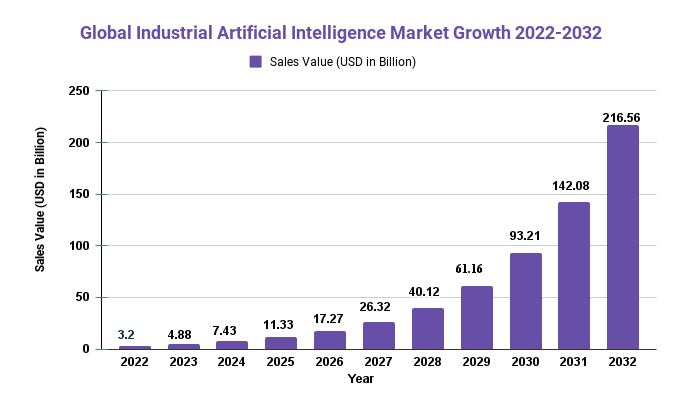Industrial Artificial Intelligence Market Is Expected To Rise At A CAGR Of 52.42% | Market.us

Page Contents
Industrial Artificial Intelligence Market Overview
The Industrial Artificial Intelligence Market encompasses the application of artificial intelligence technologies, such as machine learning, computer vision, and natural language processing to enhance industrial operations and manufacturing processes. Industrial AI is being utilized across a range of industries such as automotive, electronics, aerospace, and healthcare to optimize production yields, reduce costs, enhance safety levels, and boost profitability.
Market.us projects that the industrial AI market will grow from USD 3.2 billion in 2022 to USD 216.56 billion by 2032, at an annual compound growth rate of 52.42% during this forecast period. This growth can be attributed to increasing automation across various industries, the need for improved operational efficiency, and increasing interest in autonomous robots.
Geographically, North America is expected to be the leading market for industrial AI during the forecast period, followed by Europe and Asia Pacific. This growth can be attributed to the increasing adoption of Industry 4.0 technologies as well as an uptick in real-time data analytics across various industries in these regions.
Overall, the industrial AI market is expected to experience rapid growth over the coming years as more businesses look to implement AI technologies to enhance their operational efficiency and gain a competitive advantage in their respective industries.
Understand the scope of our full report Grab a Report Sample: https://market.us/report/industrial-artificial-intelligence-market/request-sample/

Key Takeaways
- The global Industrial AI market is projected to experience a compound annual growth rate (CAGR) of around 52.42% during the forecast period (2022-2032).
- The Industrial IoT (Industrial Internet of Things) and the rising need for automation and digitalization in the industrial sector are driving growth in this market.
- The machine learning technology segment is expected to dominate the market during the forecast period due to its extensive applications in predictive maintenance, quality control, and anomaly detection.
- North America is expected to dominate the Industrial AI market during the forecast period due to a number of key players and increasing adoption of AI technologies within this region.
- The key players in the Industrial AI market include Siemens AG, General Electric Company, IBM Corporation, Microsoft Corporation, and Intel Corporation among others.
Regional Snapshot
- North America is the leading market for Industrial AI, due to the presence of major players and the increasing adoption of AI technologies within this sector.
- Europe: Displaying a significant growth trajectory due to the increasing focus on Industry 4.0 and the adoption of AI technologies within the manufacturing sector.
- Asia-Pacific: Growing at the fastest rate due to the increasing adoption of AI technologies in manufacturing and increased demands for automation and digitalization across industrial sectors in countries such as China and India.
Drivers
- The industrial sector is experiencing an uptick in automation and digitalization demands.
- Industrial IoT (IIoT) adoption is on the rise, along with Industry 4.0's need for intelligent manufacturing capabilities.
- Additionally, predictive maintenance and quality control programs have seen significant growth within this sector as a result of rising demands.
For Details on the vendor and its offerings – Buy the report!
Restrictions
- Expensive implementation costs.
- Lack of skilled personnel.
- Data Privacy and Security Concerns.
Overall, the Industrial AI market is expected to experience significant growth over the coming years due to rising demand for automation and digitalization in industrial sectors as well as growing adoption of Industrial IoT and Industry 4.0 technologies. Nevertheless, there are challenges such as high implementation costs, lack of skilled personnel, and data privacy and security worries that must be addressed.
Opportunities
- Industrial processes are seeing an uptick in demand for predictive maintenance and quality control.
- Cloud-based solutions as well as Industrial Internet of Things (IIoT) technologies are seeing increasing adoption.
- There is an increasing need for optimization and automation in manufacturing processes to reduce costs and boost efficiency.
- Developments in machine learning algorithms and artificial intelligence technologies have been made with industrial applications in mind.
- Businesses are becoming more aware of the advantages of industrial artificial intelligence for decision-making and operations.
Challenges
- High implementation costs and complexity of integrating AI systems with existing industrial processes and technologies.
- Lack of skilled professionals knowledgeable in AI and machine learning for industrial applications.
- Concerns about data privacy and security risks in industrial settings.
- Due to the complex and variable nature of industrial processes, AI systems often experience reliability and accuracy issues. Businesses also often resist change or adopt new technologies due to fear of disruption.
Recent Developments
- Advancements in computer vision and image recognition technologies for industrial applications, such as defect detection and quality control.
- Integration of AI with robotic process automation (RPA) helps automate repetitive tasks and streamline operations.
- Edge computing and real-time processing capabilities for AI systems to improve response time and reduce latency.
- Rapid growth in natural language processing (NLP) and voice recognition technologies used for human-machine interaction in industrial settings.
- Expansion of AI capabilities for supply chain management, including demand forecasting and inventory optimization.
Key Market Segments
Type
- Hardware
- Software
Application
- Semiconductor and Electronics
- Energy and Power
- Pharmaceuticals
- Automobile
- Heavy Metals and Machine Manufacturing
- Food and Beverages
- Others (Textiles & Aerospace)
Key Market Players included in the report
- Intel Corporation
- Siemens AG
- IBM Corporation
- Alphabet Inc
- Microsoft Corporation
- Cisco Systems#Inc
- General Electric Company
- Data RPM, Sight Machine
- General Vision#Inc
- Rockwell, Automation Inc
- Mitsubishi Electric Corporation
- Oracle Corporation
- SAP SE
Grow your profit margin with Market.us @ inquiry Here
Report Scope
| Report Attribute | Details |
| The market size value in 2022 | USD 3.2 Bn |
| Revenue forecast by 2032 | USD 216.56 Bn |
| Growth Rate | CAGR Of 52.42% |
| Regions Covered | North America, Europe, Asia Pacific, Latin America, and Middle East & Africa, and the Rest of the World |
| Historical Years | 2017-2022 |
| Base Year | 2022 |
| Estimated Year | 2023 |
| Short-Term Projection Year | 2028 |
| Long-Term Projected Year | 2032 |
Frequently Asked Questions
Q: What is industrial artificial intelligence?
A: Industrial artificial intelligence refers to the application of AI technologies like machine learning, computer vision, and natural language processing in industrial settings in order to enhance operations and decision-making processes.
Q: What are some examples of industrial AI applications?
A: Industrial AI applications range from predictive maintenance and quality control, defect detection, and supply chain management, to process optimization.
Q: What are the advantages of industrial AI?
A: Industrial AI has numerous benefits for businesses, such as cost reduction, increased efficiency, better quality control, and optimized operations through predictive maintenance and process optimization.
Q: What are the challenges associated with implementing industrial AI?
A: Implementing industrial AI presents several difficulties, such as high implementation costs, difficulty integrating it with existing processes and technologies, and a shortage of skilled professionals knowledgeable about AI applications for industrial use.
Q: What is the Future of Industrial AI?
A: Industrial AI's future is expected to involve further advancements in computer vision, natural language processing, and edge computing as well as increased adoption of cloud-based and IIoT technologies. The focus will be on creating more precise and dependable AI systems that can automate various industrial processes while optimizing operations.
The team behind market.us, marketresearch.biz, market.biz and more. Our purpose is to keep our customers ahead of the game with regard to the markets. They may fluctuate up or down, but we will help you to stay ahead of the curve in these market fluctuations. Our consistent growth and ability to deliver in-depth analyses and market insight has engaged genuine market players. They have faith in us to offer the data and information they require to make balanced and decisive marketing decisions.